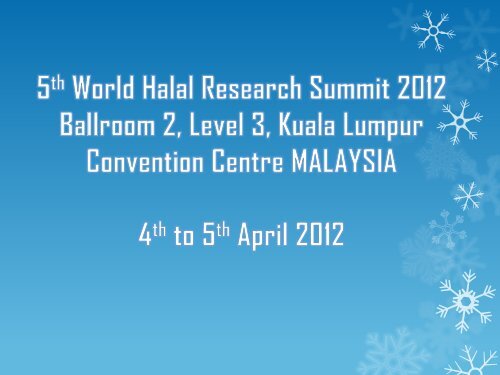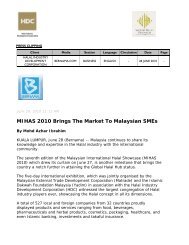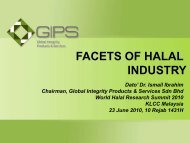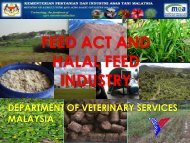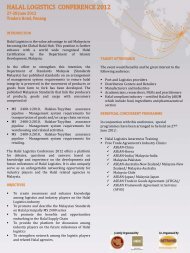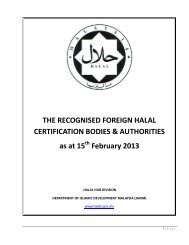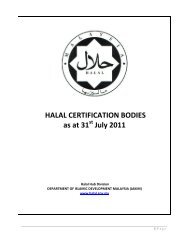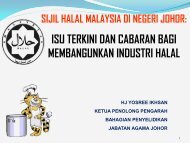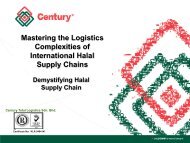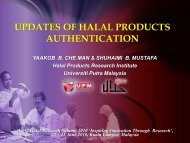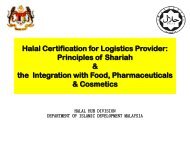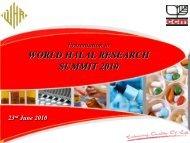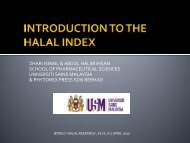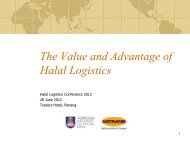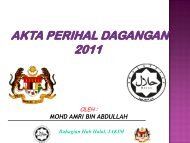Alternative Institutions to Riba - Halal Industry Development ...
Alternative Institutions to Riba - Halal Industry Development ...
Alternative Institutions to Riba - Halal Industry Development ...
You also want an ePaper? Increase the reach of your titles
YUMPU automatically turns print PDFs into web optimized ePapers that Google loves.
ISLAMIC FINANCIAL INSTITUTIONS: REMEDY FOR THE CURRENT<br />
ECONOMIC & FINANCIAL CRISES<br />
BY<br />
DR. MAGDA ISMAIL
CONTENTS<br />
‣Background of the study.<br />
‣Global economic issues.<br />
‣Global financial crises.<br />
‣The way out!<br />
‣Islamic economic system is the solution<br />
‣Re-looking at the Islamic Financial <strong>Institutions</strong>
BACKGROUND<br />
OF THE<br />
STUDY<br />
‣At the present time almost all countries are<br />
following the capitalist system which approved<br />
its failure in the 21 st century.<br />
‣This urged economists <strong>to</strong> search for<br />
alternative system <strong>to</strong> solve the current<br />
economic and financial crises.
PYRAMID OF CAPITALIST SYSTEM<br />
(issued by Nedeljkovich, Brashick and Kuharich, Cleveland: The International Publishing Co., 1911)<br />
5
GLOBAL ECONOMIC ISSUES<br />
http://www.globalissues.org/issue/235/consumption-and-consumerism<br />
Global Priority<br />
$U.S. Billions<br />
Cosmetics in the United States 8<br />
Ice cream in Europe 11<br />
Perfumes in Europe and the United States 12<br />
Pet foods in Europe and the United States 17<br />
Business entertainment in Japan 35<br />
Cigarettes in Europe 50<br />
Alcoholic drinks in Europe 105<br />
Narcotics drugs in the world 400<br />
Military spending in the world 780
GLOBAL ECONOMIC ISSUES<br />
http://www.globalissues.org/issue/235/consumption-and-consumerism<br />
Global Priority<br />
C<br />
$U.S. Billions<br />
Basic education for all 6<br />
Water and sanitation for all 9<br />
Reproductive health for all women 12<br />
Basic health and nutrition 13
TOTAL DEBT $40.83 TRILLION
THE WAY OUT ‣This crises raised the question of whether the Islamic<br />
economic system is capable of solving such crises or<br />
not, ignoring that Islam is suitable for all centuries and<br />
for all mankind.<br />
‣Allah (swt) in Surat al-Maidah 5:3 mentioned that:<br />
This day I have Perfected your religion For you, completed<br />
My favour upon you, And have chosen for you Islam as<br />
your religion.<br />
HENCE a perfect and a comprehensive system has been<br />
send by the Crea<strong>to</strong>r <strong>to</strong> serve mankind in the best way.
Hadith<br />
The Prophet (pbuh) also mentioned that in his hadith:<br />
…I have left two things behind me for you (the Ummah). You<br />
will never go astray as long as you follow these two things.<br />
One of these two things is Allahs Holy Book (the Quran al-<br />
Kareem) and the other is the Sunnah of his Most Beloved<br />
Prophet (pbuh). Muwatta Imam Malik
Cont...<br />
‣Hence, through Islamic teaching one can<br />
realized that many institutions have been<br />
provided, in the Quran and implemented by the<br />
Prophet (pbuh)ancd continued for 1300 years<br />
(great Islamic civilization)<br />
‣Each has its own role <strong>to</strong> play in solving the<br />
different economics, social and financial<br />
problems.<br />
‣Comparable <strong>to</strong> man‟s creation.
The Prophet (pbuh) said:<br />
Such as the believers in their mutual love, mercy and compassion is<br />
like one body if one part complained the whole body will suffer from<br />
fever and pain.<br />
KEY SOLUTION: Revive all Islamic financial institutions, within the<br />
Islamic Economic Structure, and put them in<br />
practice according <strong>to</strong> the teaching of Islamic for a<br />
just and a perfect society.
CHART (1):<br />
THE STRUCTURE OF ISLAMIC ECONOMIC SYSTEM<br />
HCD<br />
(KNOWLEDGE & ETHICS)<br />
SELF-MONITORING AND STATE MONITORING<br />
I‘MAR AL-ARD/ECONOMIC ACTIVITY<br />
1. HOW DOSE MAN ACQUIRE HIS WEALTH?<br />
2. HOW DOSE MAN SPEND HIS WEALTH?
WHAT IS THE<br />
ROLE OF MAN<br />
IN THIS<br />
WORLD?<br />
Man‟s role as came in the Quran:<br />
1. To worship Allah as mentioned in Surat al-Zariyat<br />
(51:56):<br />
“I have only created Jinns and men, that They may serve Me”,<br />
2. To develop this earth i„mar al-ard/ economic development as<br />
mentioned in Surat Hud (11:61):<br />
“…It is He Who hath produced you From the earth and settled you<br />
Therein…”
How <strong>to</strong> achieve „ibadah/worshiping and<br />
„imar al-ard/economic development<br />
according <strong>to</strong> Islam?
CONCEPT OF<br />
STRUGGLING<br />
To achieve falah/success in the hereafter Man<br />
has <strong>to</strong> struggle in this world in gaining his halal<br />
earning and fulfilling his responsibilities <strong>to</strong>wards<br />
his society, as mentioned in al-Quran<br />
Verily We have created Man in<strong>to</strong> <strong>to</strong>il and struggle<br />
(Surrat al-Balad 90:4)<br />
HENCE man has <strong>to</strong> struggle, according <strong>to</strong> the teaching of Islam,<br />
through out his whole journey in this life for a better place in the<br />
hereafter.
THE STRUCTURE OF ISLAMIC ECONOMIC SYSTEM<br />
HCD<br />
(KNOWLEDGE & ETHICS)<br />
SELF-MONITORING AND STATE MONITORING<br />
I‘MAR AL-ARD/ECONOMIC ACTIVITY<br />
1. HOW DOSE MAN ACQUIRE HIS WEALTH?<br />
2. HOW DOSE MAN SPEND HIS WEALTH?
PILLARS FOR HCD<br />
1. SEEKING KNOWLEDGE<br />
“Proclaim! (or Read!) In the name Of thy Lord and Cherisher,Who<br />
created…” (Surat Al-„Alaq, 96:1)<br />
2. PERFECTING ONES’ KHULUQ/ETHICS (measurement of ethics)<br />
“And thou (standest) On an exalted standard of character”<br />
(Surat al-Qalam 68:4)<br />
The Prophet (pubh) said:<br />
“I have been sent for the purpose of perfecting good morals”.
THE STRUCTURE OF ISLAMIC ECONOMIC SYSTEM<br />
(HCD)<br />
KNOWLEDGE & ETHICS<br />
SELF-MONITORING AND STATE MONITORING<br />
RESOURCE ALLOCATION AND I‘MAR AL-<br />
ARD/ECONOMIC ACTIVITY<br />
1. HOW DOSE MAN ACQUIRE HIS WEALTH?<br />
2. HOW DOSE MAN SPEND HIS WEALTH?
HOW TO ACHIEVE<br />
DEVELOPMENT IN<br />
ISLAM<br />
To be involved in the process of any economic activity two types of<br />
moni<strong>to</strong>ring is needed in Islam.<br />
1. Self Moni<strong>to</strong>ring<br />
Through practicing Ihsan man can convert his daily activities in<strong>to</strong><br />
worshiping Allah swt with such a presence and concentration as if one<br />
can see Allah and if being unable <strong>to</strong> see Allah, Allah nevertheless sees<br />
man.<br />
2. State Moni<strong>to</strong>ring<br />
Islam gives the state a great responsibility in setting up the guidance<br />
for „imar al-ard and through close moni<strong>to</strong>ring through the institution<br />
of Al-Hisbah which is <strong>to</strong> encourage all halal/lawful activities in the<br />
society and <strong>to</strong> discourage all haram/unlawful activities form the<br />
society.
THE STRUCTURE OF ISLAMIC ECONOMIC SYSTEM<br />
(HCD)<br />
KNOWLEDGE & ETHICS<br />
SELF-MONITORING AND STATE MONITORING<br />
I‘MAR AL-ARD/ECONOMIC<br />
ACTIVITY<br />
1. HOW DOSE MAN ACQUIRE HIS WEALTH?<br />
2. HOW DOSE MAN SPEND HIS WEALTH?
1. Acquiring wealth in Islam<br />
from any sec<strong>to</strong>r?<br />
As a khalifah /vicegerent in this<br />
world every individual is<br />
responsible for developing his<br />
society in order <strong>to</strong> gain his living.<br />
Each can participate in the sec<strong>to</strong>r<br />
he prefers according <strong>to</strong> his<br />
knowledge and skills.
<strong>Alternative</strong><br />
<strong>Institutions</strong><br />
<strong>to</strong> <strong>Riba</strong><br />
In Islam the issue of riba/interest and selfinterest<br />
maximization is not allowed hence,<br />
Islam provides alternative financial<br />
institutions <strong>to</strong> riba.
CHART 2:<br />
RESOURCE ALLOCATION & I‘MAR AL-ARD/ECONOMIC DEVELOPMENT<br />
1. HOW MAN ACQUIRES HIS WEALTH?<br />
FINANCIAL INSTITUTIONS<br />
1. PRIVATE ENTERPRISE INSTITUTION<br />
2. ALTERNATIVE INSTITUTIONS TO RIBA<br />
• TRADE & BUSNIESS (COMMERCIAL ACTIVITIES)<br />
• COMPULSORY INSTITUTION<br />
• VOLUNTARY INSTITUTIONS<br />
• LENDING INSTITUTION (AL-QARD HASSAN)<br />
<strong>Alternative</strong> institutions <strong>to</strong> <strong>Riba</strong><br />
Agriculture Sec<strong>to</strong>r Industrial Sec<strong>to</strong>r Infrastructure Sec<strong>to</strong>r<br />
Mining & Constructions<br />
Service Sec<strong>to</strong>r<br />
INCOME AND WEALTH ACQUIRED<br />
-Rent<br />
-Wages, Salaries<br />
-Profit, Dividends, etc.<br />
2. HOW DOES MAN SPEND HIS WEALTH?<br />
SPENDING ON MAN’S NEED<br />
(Hierarchy of Muslims’ Needs)<br />
RE-DISTRIBUTION<br />
Compulsory and Voluntary
TRADE & BUSINESS INCLUDING ISLAMIC BANKS<br />
AN ALTERNATIVE INSTITUTION TO RIBA<br />
“…Allah hath permitted trade and forbidden usury…”<br />
(Surat al-Baqarah 2: 276)
ZAKAH AN ALTERNATIVE INSTITUTION TO RIBA<br />
“And that which you give in gift (<strong>to</strong> others), in other that it may<br />
increase (your wealth by expecting <strong>to</strong> get a better one in<br />
return) from other people‟s property, has no increase with<br />
Allah; but that which you give in Zakat seeking Allah‟s<br />
Countenance, then those they shall have manifold increase.”<br />
(Surat al-Rum, 30:39)
SADAQAH AN ALTERNATIVE INSTITUTION TO<br />
RIBA<br />
“Allah will deprive usury of all blessing, but will give increase<br />
for deeds of charity…”<br />
(Surat al-Baqarah 2: 276)
QARD HASSAN<br />
AN ALTERNATIVE INSTITUTION TO RIBA<br />
Who is he That will loan <strong>to</strong> God A beautiful loan, which God Will<br />
double un<strong>to</strong> his credit And multiply many times?<br />
(Surat al-Baqarah 2:245)
CHART 2:<br />
RESOURCE ALLOCATION & I‘MAR AL-ARD/ECONOMIC DEVELOPMENT<br />
1. HOW MAN ACQUIRES HIS WEALTH?<br />
FINANCIAL INSTITUTIONS<br />
1. PRIVATE ENTERPRISE INSTITUTION<br />
2. ALTERNATIVE INSTITUTIONS TO RIBA<br />
• TRADE & BUSNIESS (COMMERCIAL ACTIVITIES)<br />
• COMPULSORY INSTITUTION<br />
• VOLUNTARY INSTITUTIONS<br />
• LENDING INSTITUTION (AL-QARD HASSAN)<br />
<strong>Alternative</strong> institutions <strong>to</strong> <strong>Riba</strong><br />
Agriculture Sec<strong>to</strong>r Industrial Sec<strong>to</strong>r Infrastructure Sec<strong>to</strong>r<br />
Mining & Constructions<br />
Service Sec<strong>to</strong>r<br />
INCOME AND WEALTH ACQUIRED<br />
-Rent<br />
-Wages, Salaries<br />
-Profit, Dividends, etc.<br />
2. HOW DOES MAN SPEND HIS WEALTH?<br />
SPENDING ON MAN’S NEED<br />
(Hierarchy of Muslims’ Needs)<br />
RE-DISTRIBUTION<br />
Compulsory and Voluntary
HOW DOES MAN SPEND<br />
HIS WEALTH?<br />
After acquiring wealth through<br />
the process of economic<br />
activities, and according <strong>to</strong> the<br />
teaching of Islam, man has <strong>to</strong><br />
spend part of his wealth <strong>to</strong> satisfy<br />
his needs and part <strong>to</strong> be<br />
redistributed <strong>to</strong> ensure a just and<br />
equitable distribution of wealth
CHART 3:<br />
SPENDING WEALTH FOR MAN’S NEED<br />
HIERARCHY OF MUSLIM’S NEED<br />
Daruriyyat<br />
(Necessities)<br />
Hajiyyat<br />
(Conveniences)<br />
Tahsiniyyat<br />
(Refinements/Beautifi<br />
cation)
HIERARCHY OF<br />
MUSLIM’S NEED<br />
Daruriyyat /Necessities: needs <strong>to</strong> protect alnafs/man‟s<br />
physical existence, i.e. food,<br />
clothing and shelter; protection of din/<br />
religion; protection of al-„aql/mind, protection<br />
of al-nasl/progeny or pedigree, and almal/property.<br />
Hajiyyat/Conveniences: which include things<br />
that improve on the quality of life and remove<br />
bearable hardship and difficulties.<br />
Tahsiniyyat/Refinements/Beautification:<br />
which adds beauty and elegance <strong>to</strong> life without<br />
transgressing the limits of moderation as<br />
defined by the Shariah.
GLOBAL ECONOMIC ISSUES<br />
http://www.globalissues.org/issue/235/consumption-and-consumerism<br />
Global Priority<br />
$U.S. Billions<br />
Cosmetics in the United States 8<br />
Ice cream in Europe 11<br />
Perfumes in Europe and the United States 12<br />
Pet foods in Europe and the United States 17<br />
Business entertainment in Japan 35<br />
Cigarettes in Europe 50<br />
Alcoholic drinks in Europe 105<br />
Narcotics drugs in the world 400<br />
Military spending in the world 780
CHART 2:<br />
RESOURCE ALLOCATION & I‘MAR AL-ARD/ECONOMIC DEVELOPMENT<br />
1. HOW MAN ACQUIRES HIS WEALTH?<br />
FINANCIAL INSTITUTIONS<br />
1. PRIVATE ENTERPRISE INSTITUTION<br />
2. ALTERNATIVE INSTITUTIONS TO RIBA<br />
• TRADE & BUSNIESS (COMMERCIAL ACTIVITIES)<br />
• COMPULSORY INSTITUTION<br />
• VOLUNTARY INSTITUTIONS<br />
• LENDING INSTITUTION (AL-QARD HASSAN)<br />
<strong>Alternative</strong> institutions <strong>to</strong> <strong>Riba</strong><br />
Agriculture Sec<strong>to</strong>r Industrial Sec<strong>to</strong>r Infrastructure Sec<strong>to</strong>r<br />
Mining & Constructions<br />
Service Sec<strong>to</strong>r<br />
INCOME AND WEALTH ACQUIRED<br />
-Rent<br />
-Wages, Salaries<br />
-Profit, Dividends, etc.<br />
2. HOW DOES MAN SPEND HIS WEALTH?<br />
SPENDING ON MAN’S NEED<br />
(Hierarchy of Muslims’ Needs)<br />
RE-DISTRIBUTION<br />
Compulsory and Voluntary
RE-DISTRIBUTION OF<br />
WEALTH IN ISLAM<br />
‣Part of the acquired income and<br />
wealth must be redistributed in order<br />
<strong>to</strong> ensure a just and equitable<br />
distribution of wealth.<br />
‣This is done through the process of<br />
redistribution which is classified in<strong>to</strong><br />
compulsory and voluntary financial<br />
institutions:
CHART 4:<br />
REDISTRIBUTION OF INCOME & WEALTH IN ISLAM<br />
FINANCIAL INSTITUTIONS<br />
(Compulsory and Voluntary)<br />
MUSLIM<br />
NON-MUSLIM<br />
COMPULSORY<br />
INHERITANCE<br />
INSTITUTION<br />
COMPULSORY ZAKAH<br />
1.Zakah on Wealth<br />
2.Zakah on Agriculture land<br />
& products (ushr)<br />
3.Zakah al-fitr<br />
1.Jiziah<br />
2.kharaj<br />
COMPULSORY TAX<br />
(Current Taxation)<br />
BAIT A- MAL<br />
1-Zakah & Ushr<br />
2-Jiziah & Kharaj<br />
3-Others<br />
VOLUNTARY<br />
Waqf Takaful Sadaqah
8 ALTERNATIVE<br />
FINANCIAL<br />
INSTITUTIONS TO<br />
RIBA<br />
UNDER ZAKAH<br />
• Faqir/Poor (satisfy the needs of the poor)<br />
• Miskeen/Needy (assist the needy <strong>to</strong> find<br />
additional job)<br />
• „Amil/Zakah Manager (pay salary <strong>to</strong> zakah<br />
staff)<br />
• Muallafah Qulubuhm/Converts <strong>to</strong> Islam<br />
(convey the message of Islam <strong>to</strong> the whole<br />
world, through education.
CONT. 8<br />
ALTERNATIVE<br />
FINANCIAL<br />
INSTITUTIONS<br />
TO RIBA<br />
UNDER ZAKAH<br />
• Fi ar-Riqab/Liberating Slaves/Captives<br />
(looking at the prisoners needs and prepare<br />
them in facing the challenge once they are<br />
out from prison)<br />
• Gharimin/ Deb<strong>to</strong>r (assist the deb<strong>to</strong>r <strong>to</strong><br />
repay back their loans)<br />
• Fisabillillah/for the Sake of Allah (secure<br />
the country)<br />
• Ibnus Sabil/Those who are stranded<br />
during a Journey (encouragetravelling for<br />
seeking knowledge and enhance the <strong>to</strong>urist<br />
sec<strong>to</strong>r)
CHART 4:<br />
REDISTRIBUTION OF INCOME & WEALTH IN ISLAM<br />
FINANCIAL INSTITUTIONS<br />
(Compulsory and Voluntary)<br />
MUSLIM<br />
NON-MUSLIM<br />
COMPULSORY<br />
INHERITANCE<br />
INSTITUTION<br />
COMPULSORY ZAKAH<br />
1.Zakah on Wealth<br />
2.Zakah on Agriculture land<br />
& products (ushr)<br />
3.Zakah al-fitr<br />
1.Jiziah<br />
2.kharaj<br />
COMPULSORY TAX<br />
(Current Taxation)<br />
BAIT A- MAL<br />
1-Zakah & Ushr<br />
2-Jiziah & Kharaj<br />
3-Others<br />
VOLUNTARY<br />
Waqf Takaful Sadaqah
INSTITUTION OF JIZIAH AND KHARAJ<br />
Under an Islamic country Non-Muslims are exempted from<br />
military service, besides being guaranteed the safety of<br />
themselves and their properties in exchange of the payment<br />
of Jizyah & Kharaj which resembles the current tax as agreed<br />
by contemporary Muslim scholars.
OTHER<br />
INSTITUTIONS<br />
• His<strong>to</strong>rically speaking this includes ghanimah, fai‟<br />
and rikaz.<br />
• At the present time rikaz is known as any hidden<br />
natural resources such as oil, gold and silver and<br />
all types of minerals hidden in earth.<br />
• All these are income for the government and<br />
have <strong>to</strong> be placed in the state treasury in order<br />
<strong>to</strong> assist the government in fulfilling its<br />
responsibilities in securing the country and in<br />
close moni<strong>to</strong>ring the process of i„mar al ard.
CHART 4:<br />
REDISTRIBUTION OF INCOME & WEALTH IN ISLAM<br />
FINANCIAL INSTITUTIONS<br />
(Compulsory and Voluntary)<br />
MUSLIM<br />
NON-MUSLIM<br />
COMPULSORY<br />
INHERITANCE<br />
INSTITUTION<br />
COMPULSORY ZAKAH<br />
1.Zakah on Wealth<br />
2.Zakah on Agriculture land<br />
& products (ushr)<br />
3.Zakah al-fitr<br />
1.Jiziah<br />
2.kharaj<br />
COMPULSORY TAX<br />
(Current Taxation)<br />
BAIT A- MAL<br />
1-Zakah & Ushr<br />
2-Jiziah & Kharaj<br />
3-Others<br />
VOLUNTARY<br />
Waqf Takaful Sadaqah
1.<br />
SADAQAH AN<br />
ALTERNATIVE<br />
FINANCIAL<br />
INSTITUTION TO<br />
RIBA<br />
• This is a voluntary act of giving alms for the<br />
cause of Allah/fisabillilah by individuals who<br />
want <strong>to</strong> contribute more than the obliga<strong>to</strong>ry<br />
due.<br />
• This is the type of hidden sadaqah <strong>to</strong> be given<br />
<strong>to</strong> needy relatives, needy friends or needy<br />
neighbors in situation where they face<br />
temporary difficulties.<br />
• The main objective of this hidden sadaqh is <strong>to</strong><br />
finance those people rather before they will be<br />
forced <strong>to</strong> borrow with riba.
2.<br />
TAKAFUL AN<br />
ALTERNATIVE<br />
FINANCIAL<br />
INSTITUTION<br />
TO RIBA<br />
• Takaful is an institution of mutual<br />
cooperation for financial assistance and<br />
kind of protection based upon the<br />
principles of ta'awun, or mutual<br />
assistance.<br />
• In this case all participants will contribute<br />
<strong>to</strong> finance any needy participant in their<br />
group rather than letting them borrow<br />
through riba in case of financial problem.
3.<br />
WAQF AS AN<br />
ALTERNATIVE<br />
FINANCIAL<br />
INSTITUTION TO<br />
RIBA<br />
This is the voluntary act which is much<br />
recommended in Islam because it provides<br />
perpetual services.<br />
The beauty of this institution is that it<br />
provides different institutions offering<br />
perpetual services needed in each society.
CONT… 1. Institution of Waqf (Immovable)<br />
2. Institution of cash-waqf (movable)<br />
i. Waqf Shares Model<br />
ii. Waqf Takaful Model<br />
iii. Direct Model<br />
iv. Mobile Model<br />
v. Corporate Cash Waqf Model<br />
vi. Compulsory Model<br />
vii. Deposit Product Model<br />
viii. Co-Operative Model<br />
ix. Waqf Mutual Fund Model
CONT<br />
….<br />
His<strong>to</strong>rically speaking the institution of waqf provide many services needed in the different<br />
societies:<br />
• Build mosques, schools, hospitals, guest house, orphanage, students‟ hostels.<br />
• Jobs for the majority of the people in the different sec<strong>to</strong>rs.<br />
• Salaries for the Imams, muezzin, teachers, doc<strong>to</strong>rs, wages for workers.<br />
• Food for the employees and oil for the lighthouse lamps.<br />
• Transportation facilities such as roads, ferries and bridges.<br />
• Supply fresh drinking water for villages.<br />
• Build fac<strong>to</strong>ries, provide machineries, and salaries for the employees.<br />
• Helped the poor and the needy and build for them small houses.<br />
• Besides, it <strong>to</strong>ok care of prisoners and helped their relatives <strong>to</strong>o.<br />
• Took care of animals and build hospitals <strong>to</strong> cure them.<br />
NOTE: All these services were provided without any cost <strong>to</strong> the government.
PAYMENT OF ZAKAT & CASH WAQF THROUGH TAX REBATE<br />
{CASE STUDY MALAYSIA}<br />
Monthly income<br />
RM<br />
Income tax paymen<br />
RMt<br />
Considered 1 wife & 1 child<br />
2,500 Nil<br />
3,000 0<br />
4,000 130<br />
5,000 250<br />
6,000 424<br />
7,000 620<br />
8,000 860<br />
9,000 1100<br />
10,000 1352<br />
11,000 1612<br />
12,000 1872<br />
13,000 2132<br />
14,000 2392<br />
15,000 2652<br />
16,000 2899<br />
17,000 3172<br />
18,000 3432<br />
19,000 3692<br />
20,000 3952<br />
21,000 5460<br />
22,000 5720<br />
23,000 5790<br />
24,000 5980<br />
25,000 6500<br />
Zakat Payment<br />
RM<br />
Considered 1 wife & 1 child<br />
30.42<br />
41.92<br />
64.92<br />
87.92<br />
110.92<br />
133.92<br />
156.92<br />
179.92<br />
202.92<br />
225.92<br />
248.92<br />
271.92<br />
294.92<br />
317.92<br />
340.92<br />
363.92<br />
386.92<br />
409.92<br />
432.92<br />
455.92<br />
478.92<br />
501.92<br />
524.92<br />
547.92<br />
Tax-Rebate<br />
Can be directed <strong>to</strong> waqf<br />
--<br />
--<br />
65.08<br />
162.08<br />
322.08<br />
486.08<br />
703.08<br />
920.08<br />
1149.08<br />
1386.08<br />
1623.08<br />
1860.08<br />
2097.08<br />
2334.08<br />
2558.08<br />
2808.08<br />
3045.08<br />
3282.08<br />
3519.08<br />
5004.08<br />
5241.08<br />
5288.08<br />
5455.08<br />
5952.08
MONTHLY SALARIES<br />
MUSLIM POPULATION IN MALAYSIA<br />
(LABOR FORCE)<br />
10,000,000.00 X RM100 = RM1000,000,000.00<br />
RM 1 billion will be collected within on month<br />
RM 1 billion x 12 month= RM 12 billion/year<br />
($4 billion)
Zakah form Monthly salaries selected Muslim<br />
countries<br />
Country<br />
Population<br />
In 2009<br />
Million<br />
People who<br />
live below<br />
poverty<br />
%<br />
Population<br />
who live<br />
below<br />
poverty<br />
Million<br />
Labor<br />
Force<br />
(a)<br />
Million<br />
Monthly<br />
Zakah<br />
Payment<br />
(b)<br />
$<br />
Money<br />
collected<br />
from<br />
Zakah<br />
(a x b x<br />
12mths)<br />
$ billion<br />
Pakistan 175 24 42 55 50 33<br />
Afghanistan 28 53 15 5 50 3<br />
Indonesia 245 18 44 100 50 60<br />
Iran 73 18 13 35 50 21<br />
Bangladesh 150 45 65 60 50 36<br />
Sudan 42 40 17 12 50 7.2<br />
Yemen 23 45 10 5 50 3<br />
Algeria 36 23 8 15 50 9<br />
Egypt 82 20 16 40 50 24<br />
Turkey 77 20 15 24 50 14.4<br />
4/12/2012 52
GLOBAL ECONOMIC ISSUES<br />
http://www.globalissues.org/issue/235/consumption-and-consumerism<br />
Global Priority<br />
C<br />
$U.S. Billions<br />
Basic education for all 6<br />
Water and sanitation for all 9<br />
Reproductive health for all women 12<br />
Basic health and nutrition 13
HOW THE ISLAMIC ECONOMIC SYSTEM SHAPE<br />
LOOK LIKE?
STRUCTURE OF ISLAMIC ECONOMIC SYSTEM
TO CONCLUDE<br />
To come out from these economics and financial crises<br />
the best way is <strong>to</strong> re-look at the Islamic <strong>Institutions</strong> for<br />
a just society.
END OF PRESENTATION<br />
Q & A


